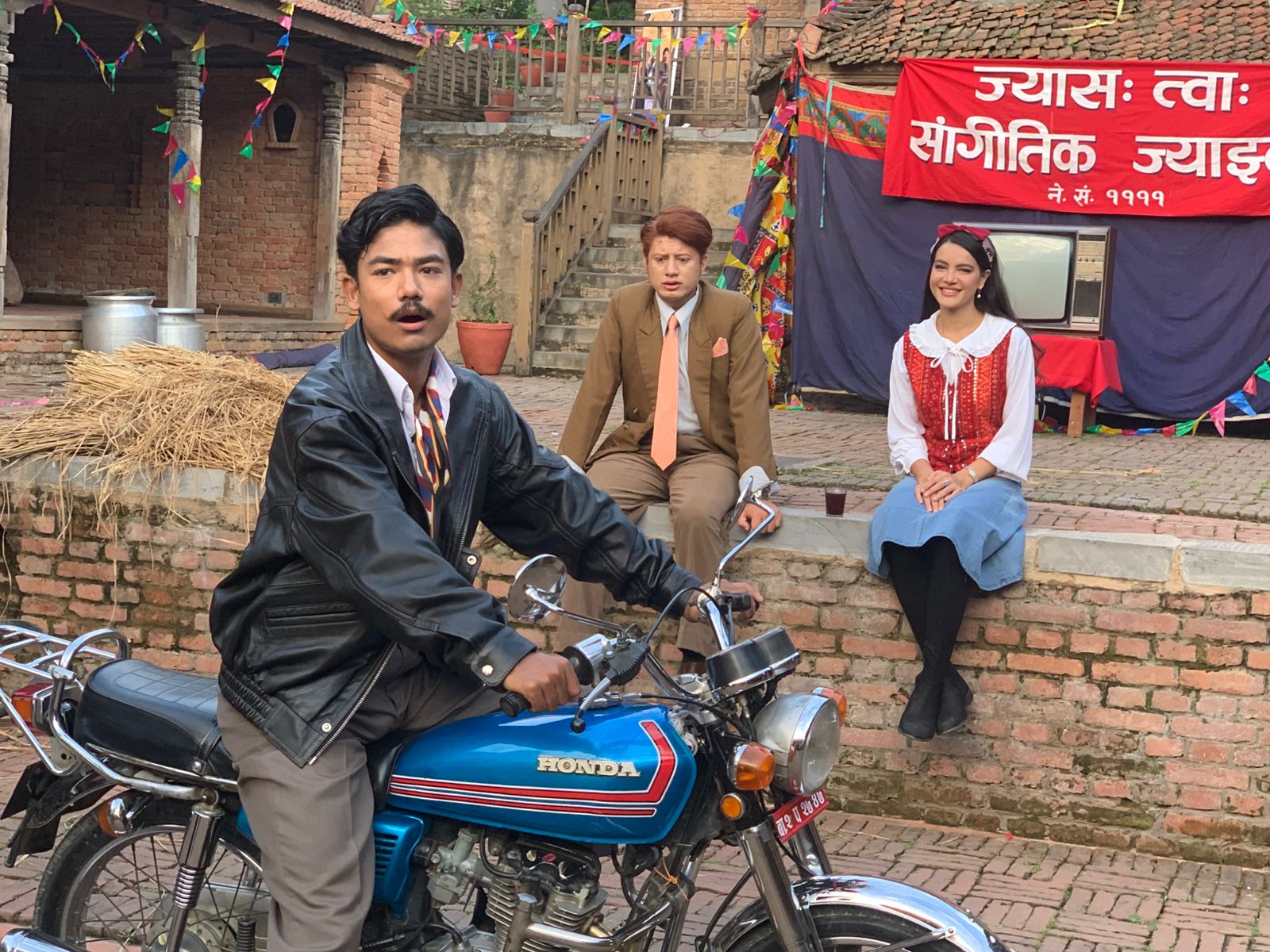Culture & Lifestyle
Patience, passion and performance
Manoj Maharjan’s career spans theatre, film, and music videos, but it’s the stage where he feels most at home.
Timila Maharjan
Manoj Maharjan, known for his roles in Newa music videos like ‘Salugu Gacha’, ‘Aila Luwaya’ and ‘Makhan Twa ya Gwa’, discovered his passion for acting through street dramas during his time at a children’s club. As a curious child eager to explore, he was drawn to the world of performance, where he found joy in entertaining others. “I became motivated after seeing people enjoy my performances,” he shares.
After high school, Maharjan discovered the world of theatre and learned it was a starting point for celebrated actors like Saugat Malla and Dayahang Rai. Intrigued, he explored various theatres and eventually joined Sarwanam Theatre in 2017. He recalls his first performance, ‘Jana Yuddha Jaari Cha’, a drama about the Maoist insurgency. The rehearsals spanned four months, during which they were made to run and do various exercises. He shares, “At one point, I was frustrated because we were just running and exercising instead of rehearsing our dialogues and practising on the stage.”
Maharjan initially didn’t know about the process of drama production and character development. Later, he learned that ‘Acting is not about trying to be someone else but being someone else.’ He realised that every director has a way of working with the actors. He says, “The experience of my first theatre performance is still fresh in my memory —people looking at me, the warmth of the light on my face.”
From a young age, his parents were supportive, having watched him perform street dramas since childhood. He could follow his passions without pressure to contribute financially to his family. However, his grandfather initially hoped he would secure a stable job to support the family. Over time, after seeing him perform in music videos, his grandfather also became supportive and recognised Maharjan’s dedication to acting.
Maharjan's journey as a theatre artist took a significant turn in 2018 when he participated in the International Theatre Festival at Sarwanam Theatre, featuring artists worldwide. Reflecting on the experience, he says, “I was thrilled about the festival and the chance to meet international artists. I often watched them rehearse from a corner, hoping to learn something."
During the festival, he met French director Maxims Sisot, who directed a drama featuring a female student from Sarwanam. By chance, Sisot needed someone to play a traditional instrument for the performance, and Maharjan volunteered to assist. This led to his involvement in the 15-minute-long drama, which was well-received. Impressed by Maharjan's talent, Sisot invited him to perform in his production the following year when he returned to Nepal.
This led him to perform in another drama directed by Sisot in 2019. It was a masked drama called ‘Pijada ki Chari’ about Kamlari Pratha. Maharjan says, “I played the character Daya Ram in this drama, one of the most memorable characters I’ve played to date.”
Six months after Sisot returned to France, Maharjan received an exciting call from him inviting him to represent Nepal at the ‘International Theatre Festival’ in France. “I was thrilled to receive the invitation and immediately shared the news with my mom,” he recalls.
At the festival, Maharjan was the youngest among ten artists from ten countries. He spent about one and a half months in France, participating in various workshops and performing theatre dramas at multiple venues. Reflecting on the experience, he shares, “It was an incredible opportunity to gain global insights into the theatre world. I learned that theatre artists face challenges sustaining themselves through their art alone, even in developed countries. However, government financial support in some nations helps ease these difficulties.”
This opportunity introduced him to advanced technologies used in France, such as dynamic stages and well-equipped technical rooms. Later, in January 2020, he participated in the ‘People’s Theatre Festival’ in Bhubaneswar, Odisha, India, further enriching his experience. He collaborated with artists from many countries, including India, Bangladesh, and South Korea. In India, he found inspiration in the concept of open theatres, which made performances more accessible to a broader audience.
Due to these experiences, Maharjan noted the stark resource differences between Nepal and other countries. Due to limited funding and equipment, Nepali theatre relies on creativity and improvisation. He believes government support, such as subsidies and financial assistance, could significantly ease these challenges for artists in Nepal.
Over the years, Maharjan has worked with Shilpee Theatre, performing in productions like ‘Thula Machha Sana Machha’, presented in the ‘Mukta Rangamanch’ format, which brings drama to various locations. His most recent performance was in ‘Sapana Anek Anek’, a musical drama directed by Ashesh Malla.
Maharjan’s passion builds his commitment to theatre, a field where he feels alive and fulfilled. In contrast, office jobs left him uninspired, as he often counted the hours until the end of the workday. Theatre rehearsals, even late at night, felt effortless and rewarding. Despite facing financial challenges in the theatre industry, he briefly considered working abroad. However, after two unsuccessful visa attempts, he realised his true calling was in theatre and acting.

While theatre remains his first love, Maharjan’s transition to on-screen acting began unexpectedly. As he prepared to move abroad for work, his childhood friend, musician Rojman Maharjan, invited him to act in a music video for the ‘Salugu Gacha’ song. The video became a viral hit, earning him recognition and prompting him to abandon plans to leave Nepal. Another successful collaboration followed with ‘Aila Luwaya’.
Manoj initially struggled to adapt to on-camera acting, finding it very different from the continuous flow of theatre. However, he embraced the challenge, honing his skills over time. His music video journey started with ‘Abira ya Holi’, directed by Gagan Raj Dangol and composed by Rojman. Manoj is involved in multiple Newa music video projects and a Newa film.
Maharjan’s passion for theatre lies in its power to deeply connect with audiences and drive social change. One of his most unforgettable experiences occurred during a street drama at Maitighar, where an elderly man handed him Rs70, expressing gratitude for addressing societal issues. This heartfelt gesture made Maharjan realise his significant responsibility as an artist to inspire change and amplify unheard voices.
Although Maharjan has earned a name in digital media, theatre remains closest to his heart. “Theatre is a complete and unique experience,” he says, emphasising how it allows him to embody a character and engage with audiences in real time. While he enjoys on-camera acting, it cannot compare to the profound sense of fulfilment he experiences on stage.
The theatre has also been a grounding force for Maharjan, keeping him humble amidst the recognition he has gained.
Maharjan joined Jyasa Films, a production team promoting Newa culture and language. His involvement began after a successful collaboration with Aashutosh Barahi on a YouTube video showcasing Dashain celebrations in a Newa household. The video received appreciation, motivating them to continue creating culturally significant content.
Jyasa Films has since become an officially registered entity and is working on producing a video series featuring character-driven stories. Eventually, they plan to create a full-length film. Their recent short thriller, ‘Khyaa Wola,’ received good support.
Maharjan continues to balance his work in digital media with his passion for theatre. He plans to expand his horizons by working on non-Newa projects for broader exposure while staying true to his roots.
For aspiring actors, he advises focusing on their craft without expecting immediate results. “Everyone’s time will come if they work hard and remain persistent. Patience is crucial in this field,” he says.




 9.7°C Kathmandu
9.7°C Kathmandu

.jpg&w=200&height=120)













